Periodontal Treatment
Trucare Periodontal treatment in Roswell GA provides treatment for gingivitis, periodontal disease or gum infection. Trucare dentistry provides treatment of gum disease in form of routine dental cleaning, scaling and root planning also known as deep cleaning followed by periodontal maintenance or gum surgery. We provide periodontal care to prevent you from loosing teeth from periodontal disease.
There are two primary stages of gum disease:
1. Gingivitis
Everyone's mouth contains bacteria that cause gum disease. With regular checkups and good daily oral hygiene, it's possible to keep gums healthy. Since early gum disease symptoms are often mild, many people are not aware of their condition until it becomes more serious.
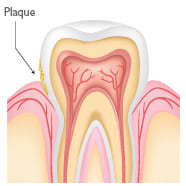
Bacterial plaque is the root of the problem
Over time, a film (plaque) builds up on your teeth. A primary cause of tooth decay, plaque is a sticky substance made of bacteria, mucus, and food on the exposed parts of your teeth. Over time, plaque can harden and become trapped at the base of the tooth.
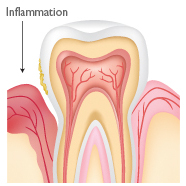
A buildup can lead to gum infection
Once plaque hardens on your teeth, it's known as tartar or calculus. Plaque and tartar can harm your gums if they are not removed. This can lead to inflamed and infected gums, also known as gingivitis.
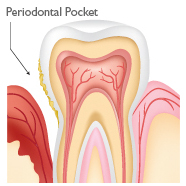
Left untreated, gum disease may progress
The infection can create deep pockets (spaces) or cause your gums to recede or pull back. This exposes the roots of your teeth and allows bacteria to grow above and below the gumline. Over time, the bones, gums, and connective tissue that support the teeth are destroyed. Eventually, teeth can become loose and may need to be removed.
Treatment for Gingivitis
Prophylactic dental cleanings and proper home care helps in treating gingivitis. It involves removing plaque (soft, sticky, bacteria infested film) and tartar (calculus) deposits that have built up on the teeth over time.
2. Periodontal Disease or Gum disease
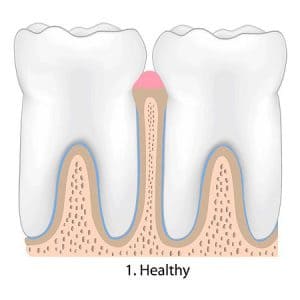

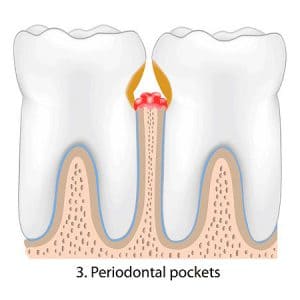
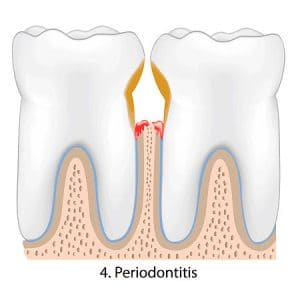
-
What is Periodontitis?
When plaque and tartar build around the tooth, it can harm your gums if it's not removed. This can lead to inflamed and infected gums, also known as gingivitis. When gingivitis is left untreated, the bacteria and tartar grow between gum and tooth which creates swelling of the gum and resorption of the bone which pulls the gum away from the teeth and form pockets which are called periodontal disease. These small spaces between teeth and gums collect debris and can become infected. If it's not treated, then it can destroy the structures that support your teeth in your jawbone. Eventually, your teeth can become so loose that they have to be extracted.
-
What are the signs and symptoms of Periodontal disease?
Gums that bleed easily, Red, swollen, tender gums, Persistent bad breath or bad taste, Permanent teeth that are loose or separating.
Treatment with Scaling and Root Planing
In the early stages of periodontitis scaling and root, planing is performed. In this procedure, an ultrasonic cleaning device is used to remove plaque and tartar from your teeth where regular cleaning devices can't reach which is performed under anesthesia. Then the rough surface of the tooth and the root are smoothed out (planed). This provides a healthy, clean surface that makes it easier for the gum tissue to reattach to the tooth.
If you address your gum disease before it becomes severe, scaling and root planing may be the only treatment you need.
-
Post op care after Scaling and Root planing
After removing bacteria and tartar gums heal and reattach to the teeth but bone loss due to periodontal disease doesn't regrow without surgical intervention. So it is very important to keep maintaining cleaning 3 to 4 times a year to prevent progression of periodontal disease and loss of bone around the teeth. Home care is very important to keep the gums healthy. You must brush and floss daily, eat a healthy diet, avoid tobacco use, and have regular dental checkups. Even after a successful scaling and root planing, if you don't attend to your teeth properly, it's quite likely that you'll develop gum disease again.
-
Preventing Gum Disease
Regular dental checkups and periodontal examinations are important for maintaining your health and the health of your smile. You don't have to lose teeth to periodontal disease, and by practicing good oral hygiene at home, you can significantly reduce your chances of ever getting gum disease. Remember to brush regularly, clean between your teeth, eat a balanced diet, and schedule regular dental visits to help keep your smile healthy.



